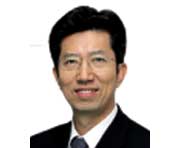On the eve of the Dec. 19 presidential election, I was on my way home by subway. I was sitting on one of the seats reserved for the elderly as it was not crowded. Minutes later a man in his 30s sat in front of me and two elderly men sat beside him at the same time.
As soon as he took a seat, he glanced at the two senior citizens and abruptly asked a question: “Are you going to vote tomorrow?”
One of the elderly replied: “Of course, I will.”
And the young man said: “I believe you voted for President Lee Myung-bak in the presidential election five years ago, didn’t you?”
At the question, the two senior citizens in their 70s looked annoyed, staring at the man with a look like: “What the heck?”
As neither of the elderly answered him, the man continued: “I bet you must have voted for President Lee in the previous election. So, with the election of President Lee, have your children’s livelihood turned better over the last five years under his leadership? “
The young man didn’t look drunk. He even sounded polite as he was smiling despite the abruptness of the questions to strangers.
As he kept asking questions, one of the old men yelled at him: “You must be pro-North Korea, aren’t you?”
The young man didn’t mind the old man’s retort and instead asked another question: “I believe you will be voting for Park Geun-hye (of the ruling Saenuri Party) tomorrow? But don’t you think we need a regime change this time following the failed Lee Myung-bak administration?”
At this question, the two elderly citizens, looking dumbfounded, took turns to say how rude the young man was.
“You must be a North Korean sympathizer. We fought for our country against the communists during the Korean War. You wouldn’t be here without our generation’s sacrifice. How rude and ungracious you are,” said one of them.
Their squabbling went on and on until the young man finally got off the train. As he disappeared, the remaining two elderly lamented the insolence of the young man whom they called a “ppalgaengi” (leftist).
It was a scene testifying the deepening conflict between young and old generations. And this generational divide ― added to the already rankling ideological and regional divides ― was vividly reflected in the latest presidential election that made the Saenuri’s Park the nation’s first female leader.
The daughter of late President Park Chung-hee drew enthusiastic support from the older generation who harbor nostalgia for the strongman who orchestrated the industrialization of the war-torn country at the expense of democracy in the 1960 and 1970s.
Nearly 72 percent of voters in their 60s and elder generations cast ballots for Park. In particular, nine out of 10 people in their 50s exercised their voting rights and 63 percent of them voted for Park.
This explosive support from older generations means an enormous debt Park should repay. She must service the debt she owed to her supporters properly. They lent her their support in anticipation that she will be the President who will meet their expectations. They want President-elect Park to protect the country from North Korean followers ― they are anxious about leftist ideology permeating further into every nook and cranny of society.
The unprecedented voting heat from those in their 50s means that they have their own anxieties they want the next president to address.
One of their main anxieties is about housing prices. Many of those in their 50s are “house poor” who are financially strapped by mortgages. They are pinning their hopes on Park for a rebound of housing prices ― the only vehicle to pull them out of aggravating mortgage problems.
In contrast, those in their 20s and 30s are in dire straits due to high tuition fees and difficulties landing a job. With housing and child-raising costs soaring, it became harder for young people to get married and have children.
The young man and two elderly men I met on the subway only tried to insist on what they think is right, showing a wide gap that seems unlikely to narrow.
The generational conflict is the clash of anxieties each generation has. In a battle to pick a leader they think is the right candidate to dissipate their anxieties, older generations joined forces to pull off a win.
President-elect Park faces a tall task to strike a balance between policies for the young and older generations. Only when she tries to communicate with each generation and listens to their woes real hard with an open mind, will she be able to help lift anxieties that heavily weigh on society. <The Korea Times/Cho Jae-hyon>


